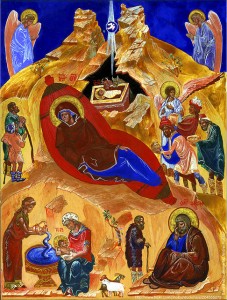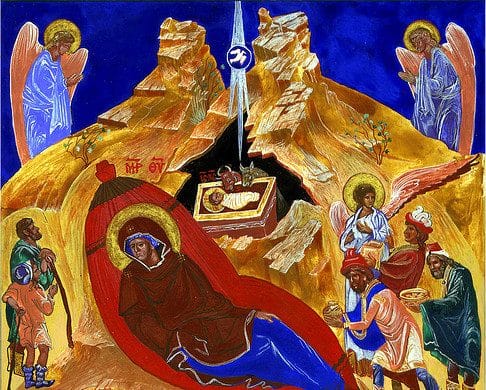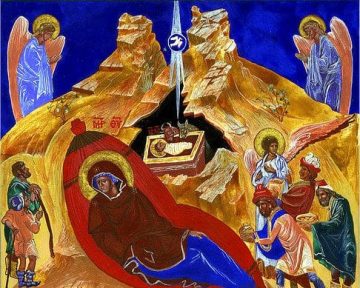Click for French Translation/Traduction en français
The Christmas story could be considered as a series of invitations from God to humans to come to Christ. I think it would be a good idea to step through the Christmas story and talk about how God is inviting people to come to Christ. As you read or discuss each story, as the class a few questions:
- Who is God using to testify of Christ? Who is being told of Christ?
- How is the news of Christ received? What does the person/people do with the news?
- What traits do each of these people personify? (maybe lists these on the board for the class to think about).
When revealing the 2014 Mutual Theme, Sister Carol F. McConkie of the Young Women’s Presidency wrote,
The faithful Saints in the story of our Savior’s birth chose to come unto Christ. They trusted the words of the prophets. They knew that “redemption cometh in and through the Holy Messiah” (2 Nephi 2:6). And so they waited and anticipated His coming. They made choices that prepared them to worthily receive the Messiah who was the Savior of the world. And they became His witnesses.
The Annunciation (Luke 1:27-38)
Zacharias (Luke 1:17) and Elisabeth (Luke 1:39-55)
Elisabeth is different here than the other people in these chapters, where she isn’t visited by an angel or angels. Her knowledge of Christ came through the Spirit manifesting itself in her experience of being pregnant with John the Baptist.
After those examples of angels visiting, I’d like to add in the scripture Alma 32:23, which promises all the visitation of angels.
The Wise Men (Matthew 2:1-2, 10-11)
The wise men learn of Christ through their study of prophecies and astronomy. Sometimes we are invited to come to Christ through our own studies.
Anna the Prophetess (Luke 2:36-38)
Simeon and Anna prepared themselves and waited their whole lives to testify of Christ. What sort of preparation is needed to comet to Christ?
The Nephites through Samuel the Lamanite (Helaman 14:1-12)
Nephi, son of Helaman (3 Nephi 1:11-15)
The Nephites didn’t get to see Christ immediately, but saw the signs of his birth. God invited them to come to Christ through the prophet Samuel.
Before continuing, I’ll probably share this video of the song O Come, Emmanuel.
From the examples above, how does God invite us to Christ? How can we invite others to Christ similarly?
The lesson suggests that you read from Elder Scott’s talk, I Have Given You and Example. I really liked these paragraphs from the talk:
How can each of us become such a significant influence? We must be sure to sincerely love those we want to help in righteousness so they can begin to develop confidence in God’s love. For so many in the world, the first challenge in accepting the gospel is to develop faith in a Father in Heaven, who loves them perfectly. It is easier to develop that faith when they have friends or family members who love them in a similar way.
Giving them confidence in your love can help them develop faith in God’s love. Then through your loving, thoughtful communication, their lives will be blessed by your sharing lessons you have learned, experiences you have had, and principles you have followed to find solutions to your own struggles. Show your sincere interest in their well-being; then share your testimony of the gospel of Jesus Christ.
What does your family or your friends do to come to Christ during Christmastime? Do you include others in your festivities? What is that like? If you don’t, what could you do to show love for others like Elder Scott recommends?
In the conclusion of Sister McConkie’s talk linked to above, she states:
Come unto Christ. Was there ever a more glorious call to action? At this Christmas season, come adore Him, come worship Him, and come follow Him. Receive the blessings of His love. As faithful Saints of the Lord Jesus Christ, we may come unto Christ and feel His peace and know His perfecting power.
Young Women Lesson: How Can I Invite Others to Come Unto Christ?
This lesson plan was originally based on the 2014 Young Women Lesson: How Can I Invite Others to Come Unto Christ?
Note from the author:
There are no Easter or Christmas-themed YW lessons and I think it’s a shame there aren’t outlines for these Sundays, especially since holidays are times when people who would otherwise not come to church are there to worship. So in preparation for Christmas, I’ve taken one of the December lesson plans and Christmas-ified it so that you can have a Christmas-themed lesson the Sunday before Christmas.
Here is a link to the manual for How Can I Invite Others to Come Unto Christ?
French Translation
Il n’y a pas de leçons sur les thèmes de Pâques ni de Noël pour les Jeunes Filles et je pense que c’est dommage. Ce sont des dimanche où des personnes qui ne viennent pas le reste de l’année sont présentes. En préparation pour Noël, j’ai pris l’une des leçons pour décembre et a inséré des thèmes de Noël pour le dimanche avant Noël.
L’histoire de Noël peut être considérée comme une série d’invitations de Dieu aux hommes de venir au Christ. Je pense que ce serait une bonne idée de lire l’histoire de Noël et parler de comment Dieu nous invite de venir au Christ. Pendant cette discussion, poser quelques questions à la classe :
- Dieu témoigne du Christ par l’intermédiaire de qui? A qui parle-t-on du Christ ?
- Comment reçoivent-ils la nouvelle du Christ? Que font ces personnes de cette nouvelle ?
- Quel traits de personnalité montrent ces personnes? (les écrire sur le tableau)
L’année dernière, lorsqu’on révélait le thème pour 2014 pour les jeunes, Soeur Carol F. McConkie de la Présidence des Jeunes Filles a écrit :
Les Saints fidèles dans l’histoire de la naissance de notre Sauveur ont choisi de venir Au Christ. Ils ont fait confiance aux paroles des prophètes. Ils savaient que « la rédemption vient dans et par l’intermédiaire du saint Messie » (2 Néphi 2 :6). Et donc ils ont attendu sa venue. Ils ont fait des choix qui les ont préparés à recevoir dignement le Messie qui était le Sauveur du monde. Et ils sont devenus ses témoins.
L’Annonciation (Luc 1:27-38)
Zacharie (Luc 1:17) et Elisabeth (Luc1:39-55)
Elisabeth est différente que les autre personnes de ces chapitres. Elle n’est pas visitée par un ange. Sa connaissance du Christ vient par l’intermédiaire de l’Esprit qui s’est manifesté dans sa grossesse avec Jean-Baptiste.
Joseph (Matthieu 1:20-24)
Les bergers (Luc 2:8-20)
Après tous ces exemples de visitations des anges, je voudrais ajouter Alma 32:23, qui promet à tous la visitation des anges.
Les rois mages (Matthieu 2:1-2, 10-11)
Les rois mages ont appris du Christ par l’étude des prophéties et de l’astronomie. Parfois nous sommes invités à venir au Christ par nos propres études.
Anna la Prophète (Luc 2:36-38)
Siméon et Anna se sont préparés et ont attend tout leur vie pour témoigner du Christ. Quel genre de préparation est nécessaire pour venir au Christ?
Les Néphites par l’intermédiare de Samuel le Lamanite (Hélaman 14:1-12)
Néphi, le fils d’Hélaman (3 Néphi 1:11-15)
Les Néphites n’ont pas vu le Christ immédiatement, mais ils ont vu les signes de sa naissance. Dieu les a invités à venir au Christ par l’intermédiaire du prophète Samuel.
Avant de continuer, je partagerais cette vidéo du chant O Come, Emmanuel.
A partir des exemple cités ci-dessus, comment Dieu nous invite-il au Christ ? Comment pouvons-nous inviter les autres au Christ ?
La leçon suggère de lire du discours d’Elder Scott « Je vous ai donné un exemple. » J’ai beaucoup aimé ces paragraphes :
Comment chacun d’entre nous peut-il être d’une si grande influence ? Nous devons veiller à aimer sincèrement les personnes que nous voulons aider dans le sens du bien afin qu’elles puissent commencer à acquérir de la confiance en l’amour de Dieu. Pour beaucoup dans le monde, la première difficulté pour accepter l’Évangile est d’acquérir la foi en un Père céleste qui les aime parfaitement. Il est plus facile d’acquérir cette foi lorsque nous avons des amis ou des membres de la famille qui nous manifestent ce même genre d’amour.
Leur donner confiance en votre amour peut les aider à développer leur foi en l’amour de Dieu. Puis par votre communication aimante et attentionnée et en faisant part des leçons que vous avez apprises, des expériences que vous avez eues, et des principes que vous avez suivis pour trouver des solutions à vos difficultés, vous leur apporterez des bienfaits. Montrez que vous vous intéressez sincèrement à leur bien-être ; ensuite rendez votre témoignage de l’Évangile de Jésus-Christ.
Que font votre famille ou vos amis pour venir au Christ au moment de Noël ? Invitez-vous les autres à vos célébrations ? Si non, que pouvez-vous faire pour montrer de l’amour aux autres comme le recommande Elder Scott ?
A la conclusions du discours de Soeur McConkie cite ci-dessus, elle dit :
Venez au Christ. Existe-il un appel à l’action plus glorieux? Pendant cette saison de Noël, venez l’adorer, venez le louer et venez le suivre. Recevez les bénédictions de son amour. En tant de Saints fidèles du Seigneur Jésus Christ, nous pouvons venir au Christ et ressentir sa paix et connaitre son pouvoir perfectionnant.
Avez-vous d’autres idées pour une leçon sur Noël pour les Jeunes Filles ? Partagez-les dans les commentaires !
Originally posted November 28, 2014






8 Responses
This is beautiful, Tophat! I love the concept of coming to Christ at Christmas. I can’t recall much other than admonitions to give at Christmas, which I love and are appropriate. But in reading your lesson, I became inspired to give myself to Christ at Christmas— something that makes the giving of Christmas feel more full.
Thank you for such a beautiful lesson plan!
I love this idea! When I read your introduction my first thought was actually about Herod — perhaps the main example in the Christmas story of someone who is invited and rejects that invitation in a big way. While I wouldn’t dwell on it in a lesson I think it is interesting for private pondering and study. Herod is invited and taught, but he sees only a rival to be destroyed. His request that the wise men return and report is disingenuous and deliberately manipulative. I like to think none of us are Herods. But maybe there are times when we’re invited to come to Christ and we see only the bad things that might come of it, and not the good. Or maybe we don’t understand a truth because it is beyond the scope of our imagination and world view.
I thought of including Herod, but originally didn’t know how to fit him in and then by the end of the post forgot to think to put him in! I think your take is very good and I’ll use it when I teach my laurel and miamaid class next month! Thanks!
This is great! It almost makes me wish I was in Young Women’s so I could teach it. Thank you, TopHat.
[…] fully comprehended in Christmases past. Having been inspired by the posts of spiritual strength (here and here), practical wisdom (here and here), and rhythmical words from the Exponent Christmas […]
I used this outline for my Sunday school lesson today – all girls in the class, 13-14 years old. It was wonderful! Thank you, TopHat!